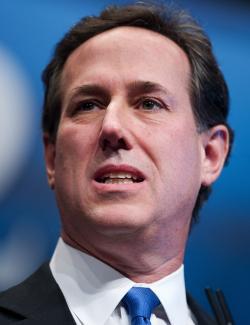On CNN last night, John King asked GOP-nominee contender Rick Santorum to opine about the Pentagon’s recent announcement that it would open more combat-oriented service roles to women—and predictably, he toed an archaically conservative line:
“I think that could be a very compromising situation, where people naturally may do things that may not be in the interest of the mission because of other types of emotions that are involved. It already happens, of course, with the camaraderie of men in combat, but I think it would be even more unique if women were in combat.”
To be fair, Santorum did note that he wanted to provide “every opportunity for women to be able to serve this country,” but he just couldn’t get over these mysterious “other types of emotions” that the presence of women might conjure up. Then, on the Today Show this morning, he offered a clarification: “Men have emotions when [they] see a woman in harm’s way. It’s natural. It’s very much in our culture to be protective. That was my concern.”
The idea of men so caring that they’re driven to distraction by concern for their female comrades would almost seem sweet if it weren’t so blatantly offensive to the brave and perfectly capable women it’s meant to flatter. The truth is that these new rules merely formalize what military leaders have known for some time: Women are just as capable of dealing with the stresses of war as their male counterparts are.
Before the change, women had been barred from serving in direct-engagement areas like infantry and special operations forces; and while the new rules still won’t allow women to serve at the front of the front-lines, they will be able to work, for example, as field medics and communications officers. Of course, as the Associated Press points out, women have been unofficially fulfilling some of these functions for years, despite opponents “questioning whether they have the necessary strength and stamina, or whether their presence might hurt unit cohesion.” The contingences of war simply made those kinds of shaky arguments seem less important.
Still, the vague notion of “unit cohesion” looms large in these debates. I wrote a piece a number of years ago on the issue of DADT and found that even liberal-minded service people worried about the instability open gays and women would introduce into the apparently delicate ecosystem of the combat unit. My opinion now is the same as it was then: If the presence of people different from you (but otherwise capable of performing the same quality of work) disrupts your ability to do your job, that’s your problem, not theirs. Santorum’s imagined soldier needs to get over his hang-ups—no matter how chivalrous they seem—and get on with it. High-stress situations and appeals to the “good of the group” can no longer be a cover for personal prejudice.
